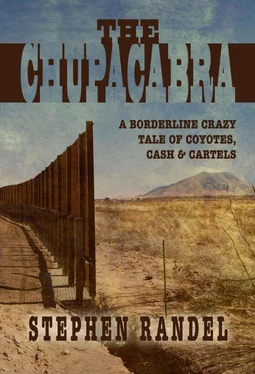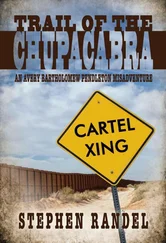El Barquero approached him after the portable lights were taken down and the truck was ready to depart. In the dark, cavernous room, the tall Mexican had lit a cigarette lighter to provide illumination for Sanders to shoot up the heroin-filled syringe he handed to him. Sanders’ shaking hands struggled to find a vein. Eventually he found one and slowly pushed the plunger down, feeling the warmth spread through his body as he slumped to the ground. The menacing man standing over him said nothing. He just stared into Sander’s eyes, into his soul. Sanders felt strange. He knew something was wrong. What he didn’t know was that the syringe contained a “hot load.” It wasn’t just heroin. He was struggling to breathe. He couldn’t breathe. He was choking. The last thing Sanders ever saw were the eyes of the “Ferryman.” Those black eyes, those evil eyes that glimmered with fire from the flickering glow of the dancing lighter flame.
Once he knew Sanders was dead, El Barquero left the body and drove the tractor-trailer across the state line into Texas. He arrived at the Port of Houston around midday. He met with the contacts his employers had promised would be waiting for him. In short order, the shipment was sealed inside a cargo-shipping container and loaded aboard a vessel bound for Puerto Barrios, Guatemala, on the Gulf of Honduras. Very few cargo containers coming into U.S. ports were checked, and almost none of the outgoing ones. A shipment of weapons this large was easier to smuggle in through the southern border of Mexico than across the northern one. El Barquero’s employers were making the rest of the arrangements to move the shipment north across Mexico to its ultimate destination in the Mexican state of Tamaulipas. His contacts took the large truck to dispose of, and he was given the keys to a car and told to meet his boss outside Piedras Negras at the farm. He knew what they meant. He’d made the trip before.
El Barquero pulled his car up to the massive yellow farmhouse surrounded by a large white wooden fence. He noticed dozens of late-model trucks and sedans parked outside the large red barn to the back and left of the house. Farther back, about fifty yards from the barn, a long row of black wooden barracks lined the back fence. Armed sentries were scattered across the compound, which was illuminated by powerful lights mounted on tall poles. As he parked his car, two guards approached with weapons poised to confirm his identity. They immediately recognized the tall gun smuggler through his open window.
“The Padre is in the barn,” one of the sentries said. “He’s been waiting to see you.”
“Why all the cars?” El Barquero inquired.
“They’re fighting the roosters tonight,” the other sentry replied.
El Barquero made his way quickly across the open compound and approached the barn door. Sounds of men shouting and swearing came from inside the building. As he entered the barn, another armed guard lowered an AK-47 in front of his path.
“Wait here,” he said. “Miguel!” he shouted at the young boy sitting on a crate next to the door. “Let the Padre know he’s here.”
Young Miguel jumped from his perch and scampered up the raised rows of seating crowded with boisterous men who surrounded the cockfighting pit, which was twenty feet in diameter. A four-foot-tall wooden fence, one side painted red, the other painted green, surrounded the pit that had been built to contain the combatants and their handlers. Miguel reached the top row of seating and ran down the aisle to the side of a balding man of medium build with a large bushy black mustache. The man wore a black suit, immaculately polished black cowboy boots, and a priest’s Roman collar. He was sitting alone. He seemed to barely notice the boy who was whispering in his ear, his attention focused on the ring below. But slowly the man in black turned and looked in El Barquero’s direction. He raised his hand and motioned toward himself. The guard lowered the weapon that blocked El Barquero’s path and nodded his approval to pass. El Barquero followed the same path the boy had taken. As he passed the boy, who was on his way back down, the boy stopped and stared intently as the large man wearing black jeans and a black T-shirt straining at the seams to contain his muscular torso strode past him. The seated man motioned for El Barquero to sit beside him.
“I’ve been told you did very well, El Barquero,” the man said as he pulled a thin sterling silver case from the inside pocket of his expensive-looking suit coat. “Very well indeed,” he continued, offering one of the thin cigars to El Barquero.
“No, gracias ,” El Barquero said as he sat down next to the man. “It’s good to see you, Padre.”
“Good to see you as well, my clever friend,” the Padre replied as he returned one of the thin cigars to his case.
“Allow me, Padre,” El Barquero said as he pulled a silver Zippo lighter from his pocket and sparked the wheel.
“ Gracias ,” the Padre replied as he leaned toward the flame and puffed several times to light the cigar. Pulling away from the flame, he held the cigar’s glowing end toward his face to ensure it was properly lit. “My people at the port said that you delivered everything precisely as planned.”
“Yes, Padre, everything went smoothly.”
“And your compatriot? The Guardsman?”
“He’s taken care of.”
“Good,” said the Padre as he took a long drag from the cigar. “Then I won’t need to arrange a hacienda in La Pesca for him after all. Even if his retirement would have been a short one.” The Padre placed his hand on El Barquero’s shoulder. “This was an important delivery, my friend. It will change the way we do business,” he said as he smiled and pounded El Barquero twice on his back. “Men,” he pointed around the crowded barn, “men I can get. They come to me. We used to advertise with billboards and videos, but not anymore. They know who we are. They come to me because I pay better than the army. I pay better than the police. Hell, I even give them health insurance. I give them life insurance. The best thing that can happen to some of their families financially is for them to die working for me,” he laughed. “Men, they come to me for work because I can protect them and give them money. Give them better lives. But guns, they’re the key. Men without guns are nothing but expensive bodies to feed and shelter. The weapons you have acquired will allow us to attack entire police stations if we want, mine roads into areas we control, and expand our territories even further to the west and south. No more shooting government officials and rivals with pistols in the middle of the night. Now we can attack like an army. You have made me very proud, and you will be well compensated for your work.”
“Thank you, Padre.”
“Do you like the roosters?” the Padre asked as he motioned down toward the ring.
“When I was a boy, I used to watch them in the village I grew up in, at the fairs to celebrate the patron saints, but I always preferred the bullfights.”
“The Corrida , of course you did. Look at you! You are the Toro !” the Padre replied as he laughed heartily and pounded El Barquero on the back again. “I prefer the roosters. The bull stands no chance. Only the matador carries the blade. His fate is sealed before he enters the ring. He’s nothing more than a magnificent warrior with his hands tied behind his back asked to put on a brave performance for the crowd in his death. But the roosters, the roosters are different, my friend. Each stands a chance. Each can determine its own fate. They may choose to die, but they can also choose to live. Look at this here,” the Padre said, pointing to a handler entering the pit with a black bird with white neck feathers. “See how the feathers around his neck flare out in anger. He has the spirit. He will not simply stamp and snort and vainly charge the matador while waiting for the inevitability of the blade.”
Читать дальше












